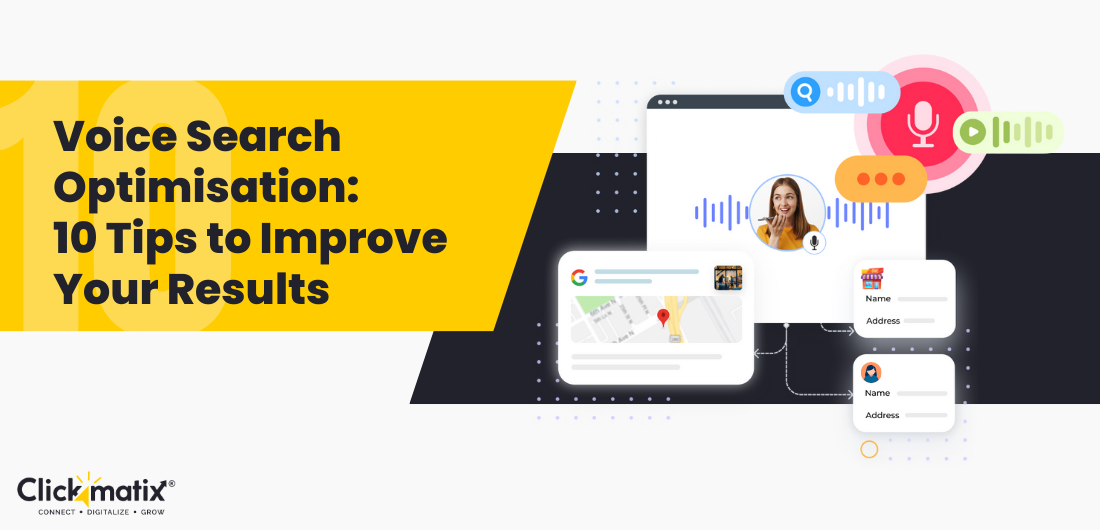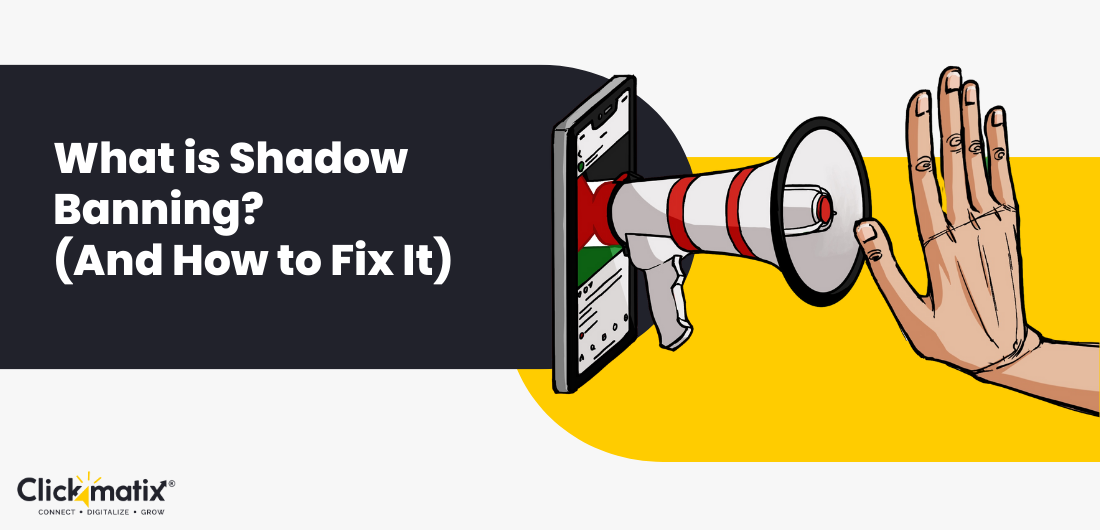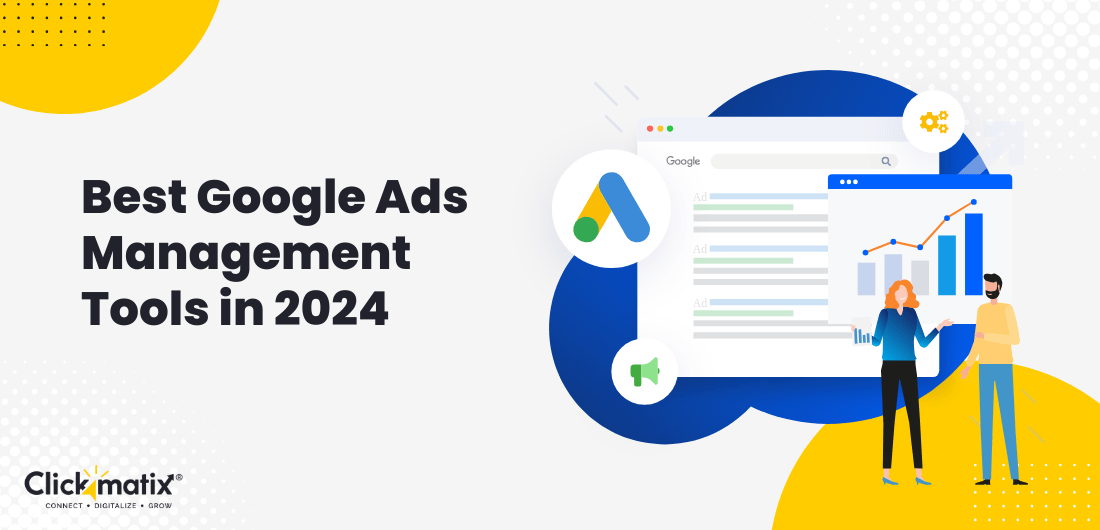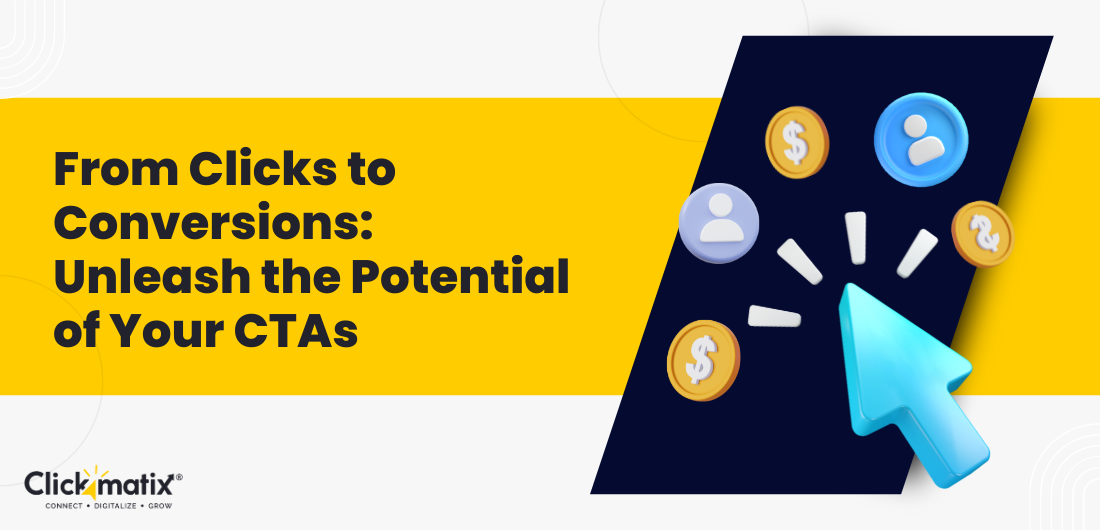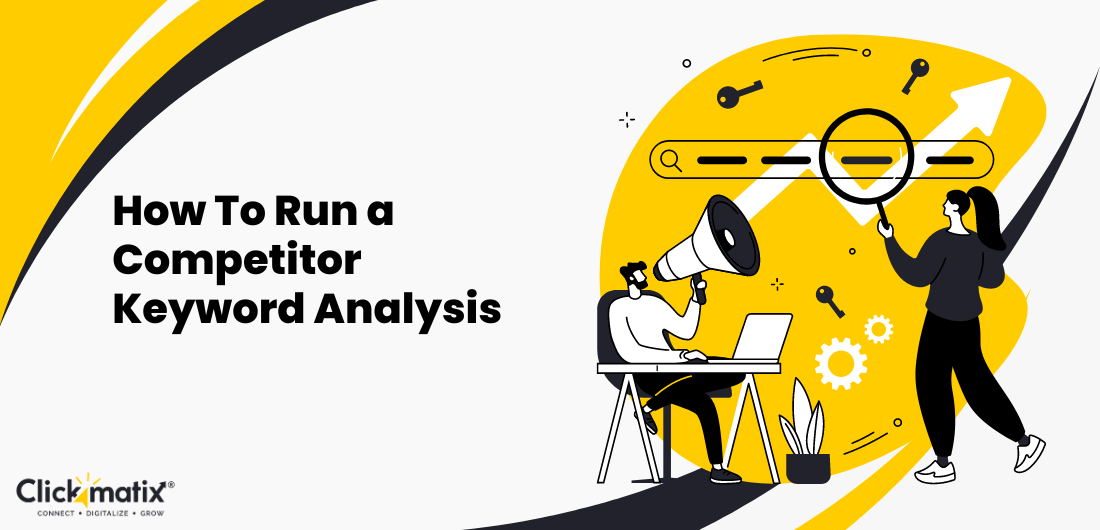12 Common Google Ads Mistakes Affecting Your Roi in 2024
Paid advertising, including Google Ads, is an effective way for businesses to promote their products or services and reach a wider audience. It can help businesses generate leads, drive traffic to their website, and increase sales. We all know that Google Adwords or Paid search marketing is one of the most popular marketing techniques, but […]
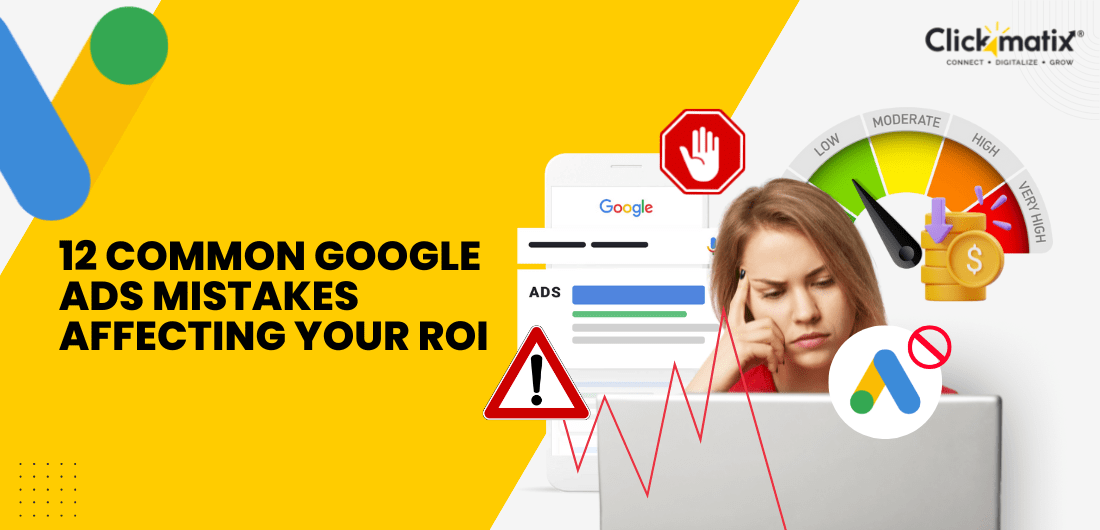
Paid advertising, including Google Ads, is an effective way for businesses to promote their products or services and reach a wider audience. It can help businesses generate leads, drive traffic to their website, and increase sales.
We all know that Google Adwords or Paid search marketing is one of the most popular marketing techniques, but when we talk about mistakes in paid ads, it’s important to understand that minor errors can lead to wasted ad spend and a low return on investment (ROI). By avoiding these Google Ads mistakes, businesses can optimise their paid advertising efforts and achieve their marketing goals.
In this blog, we’ll discuss 12 common Google Ads/paid advertising mistakes that can affect your ROI. We’ll also offer tips on how to avoid these mistakes and improve your paid efforts.
Mistake 1: Targeting the wrong audience
One of the most critical aspects of paid advertising or PPC campaign is targeting the right audience. This means ensuring that your ads are displayed to people likely to be interested in your products or services. By targeting the right audience, you can maximise the effectiveness of your ad spend and increase your ROI.
If you target the wrong audience, your Google ads may be displayed to people who are unlikely to be interested in your products or services. This can lead to a low click-through rate (CTR), a low conversion rate, and wasted ad spend.
For example, if you sell high-end luxury watches but display your ads to people looking for inexpensive fashion watches, you’re unlikely to get many clicks or conversions.
Make sure you are keeping track of your Google ad agency and what they are doing.
Mistake 2: Poor keyword research
Keyword research is a crucial component of any paid search and PPC campaign. It involves identifying the keywords and phrases search users use to search for products or services related to your business. By conducting effective keyword research, you can ensure that your ads are displayed to people looking for what you offer, thus increasing your CTR and ROI.
If your keyword research is inadequate or inaccurate, Google may not display your ads to the right people, resulting in a low CTR, low conversion rate, and wasted Google ads spend.
For example, if you sell running shoes, but your keyword research only includes general terms like “shoes,” you may display your ads to people looking for dress shoes or other types of footwear, resulting in a low conversion rate.
Mistake 3: Ignoring negative keywords
The next Google Ads mistake is ignoring negative keywords. Negative keywords are keywords or phrases for which you don’t want your ads to be displayed. Using negative keywords can prevent your ads from being displayed to people who are unlikely to be interested in your products or services.
If you don’t use negative keywords, your Google ad may be displayed to those looking for something completely unrelated to your products or services, resulting in wasted ad spend and a low ROI.
For example, if you sell high-end watches, but your ads are displayed to people searching for “cheap watches,” you’re unlikely to generate enough clicks or conversions.
Mistake 4: Inadequate ad copy
Ad copy is the text or content that appears in an advertisement or PPC campaign, whether online or offline. It is a crucial part of any advertising campaign, as it is the primary way to communicate with potential customers and convince them to take a specific action, such as making a purchase, signing up for a newsletter, or downloading an app.
The quality of your ad copy can directly impact your ROI, as well-crafted ad copy can improve conversion rates.
Inadequate ad copy can lead to various negative outcomes, such as:
- Low click-through rates: If your ad copy is dull, uninteresting, or doesn’t grab the attention of your audience, people are less likely to click on your ad. This can result in low click-through rates, which means you’re paying for impressions that aren’t converting into clicks.
- Low conversion rates: Even if people click on your Google ads, inadequate ad copy can lead to low conversion rates. If your ad copy is confusing, misleading, or doesn’t clearly communicate the value of your product or service, people are less likely to take any action.
- Wasted ad spend: If your ad copy is inadequate, you may spend more money on advertising than necessary, as you’ll need to keep paying for impressions to get the desired number of clicks and conversions.
Mistake 5: Poor landing page experience
A poor landing page experience can significantly impact your paid search campaign, leading to a high bounce rate, low conversion rates, and wasted ad spend. On the other hand, a satisfactory landing page experience can improve your conversion rates and increase your return on investment.
A poor landing page experience can lead to various negative outcomes, such as:
- High bounce rate: If your landing page doesn’t meet the expectations of your audience or takes too long to load, people are more likely to leave the page immediately. This can result in a high bounce rate, which means you’re paying for clicks that aren’t converting into leads or sales.
Whenever you use a high-quality landing page, overall Google ads management becomes easier.
- Low conversion rates: Even if people stay on your landing page, a poor landing page experience can lead to low conversion rates in your Google AdWords services. If your landing page is cluttered, confusing, or doesn’t have a clear call-to-action, people are less likely to take any action.
Always partner with a professional Google ad agency in Melbourne if you are dealing with low conversion rates.
Mistake 6: Not tracking conversions
Conversion tracking is the process of measuring the number of conversions generated by your paid advertising . A conversion is any action taken by a search user after clicking on your ad, such as making a purchase, filling out a form, or subscribing to a newsletter.
Conversion tracking is crucial because it allows you to see which ads are generating the most conversions, which can help you optimise your campaigns and improve your ROI.
Not tracking conversions can lead to various negative outcomes in your Google ads services, such as:
- Inability to measure campaign success: Without conversion tracking, you won’t be able to see which Google ads are generating the most conversions. This means you won’t know which campaigns are successful and which are not, thus eventually leading to wasted ad spend.
With an experienced Google ad agency in Melbourne, you can easily measure your campaign success.
- Inability to optimise campaigns: Conversion tracking allows you to identify ads generating the most conversions. This information can help you optimise your campaigns by adjusting your ad copy, targeting, and bidding strategies to improve your ROI.
Once you optimise your campaigns, you can do enhanced Google ads management.
- Inability to justify ad spend: Without conversion tracking, it can be difficult to justify your ad spend to your stakeholders. You won’t be able to show them the ROI of your campaigns, which may lead to decreased funding for future campaigns.
Mistake 7: Overlooking ad extensions
Ad extensions are additional information that appears alongside your ad and PPC campaigns, such as your phone number, location, or links to specific pages on your website. Google Ads Melbourne extensions can make your ad more prominent and provide additional information to potential customers, improving your click-through and conversion rates.
Overlooking ad extensions can lead to various negative outcomes, such as:
- Lower click-through rates: Ad extensions can make your ad more prominent and provide additional information to potential customers, improving your click-through rates. Overlooking ad extensions can lead to lower click-through rates, which means you’re paying for impressions that aren’t converting into clicks.
Contact the best Google ad agency in Melbourne, Clickmatix, to solve such issues.
- Lower conversion rates: Ad extensions can provide additional information to potential customers that may help them make thoughtful decisions. Overlooking ad extensions can lead to lower conversion rates, which means you’re paying for clicks that aren’t converting into leads or sales.
- Lost customers: Ad extensions can provide additional opportunities for potential customers to engage with your business, such as by calling your phone number or visiting your website. Overlooking ad extensions can lead to missed opportunities for potential customers to engage with your business.
Mistake 8: Lack of ad testing
Ad testing is the process of testing different versions of your ads to determine which performs better. By testing different ad elements, such as headlines, images, and calls to action, you can improve the performance of your advertising campaigns and maximise your ROI.
Lack of ad testing can lead to various negative outcomes, such as:
- Leads: Without testing different Google ads Melbourne elements, you may be missing opportunities to improve the performance of your ads and reach more potential customers.
- Poor ad performance: Without testing, you may be using ads that are ineffective at generating clicks, conversions, or other key performance metrics, thus leading to a lower ROI and wasted ad spend.
- Limited insights: Without testing, you may have limited insights into what works and what doesn’t in your advertising campaigns. This can make it difficult to make informed decisions about optimising your campaigns for better performance.
Mistake 9: Not optimising bids
Bid optimisation is the process of adjusting your bids for keywords, placements, or audiences to improve the performance of your advertising or PPC campaigns. By optimising your bids, you can increase the visibility of your Google ads and ensure that you’re paying the right amount for each click or impression.
Ignoring bid optimisations can lead to various negative outcomes in your Google ads, such as:
- Wasted ad spend: If you’re not optimising your bids, you may be overpaying for clicks or impressions that aren’t generating conversions, which can lead to wasted ad spend and a lower ROI. Partnering with the right Google ad agency will help you tackle such instances in the future.
- Decreased ad visibility: If you’re not bidding enough, your ads may not be showing as frequently or prominently as they could be. Thus, it can lead to a lower click-through rate and fewer conversions.
- Missed opportunities: If you’re not bidding on the right keywords or targeting the right audiences, you may miss out on opportunities to reach potential customers interested in your products or services.
Mistake 10: Neglecting mobile optimisation
Mobile optimisation is the process of optimising your website and PPC campaigns for mobile devices, such as smartphones and tablets. With the increasing use of mobile devices to browse the internet and make purchases, neglecting mobile optimisation can lead to a poor user experience and a lower ROI.
Make sure you never make this Google Adwords mistake and always optimise the ads for mobile.
Neglecting mobile optimisation can lead to various negative outcomes, such as:
- Poor user experience: If your website or advertising campaigns are not optimised for mobile devices, potential customers may have difficulty navigating or using your site. This can lead to a poor user experience and a lower likelihood of conversion.
- Low SERP visibility: Many advertising platforms, such as Google Ads Melbourne, prioritise mobile-friendly websites and advertising campaigns. Neglecting mobile optimisation can lead to low SERP visibility and fewer click-through rates.
- Missed opportunities: With the increasing use of mobile devices to browse the internet and make purchases, neglecting mobile optimisation will restrict your business from reaching potential customers using mobile devices for everything.
Mistake 11: Failing to monitor competitors
Monitoring your competitors is crucial for staying ahead of the competition and improving the performance of your advertising campaigns. By monitoring your competitors, you can gain insights into their strategies, tactics, and performance metrics and use this information to improve your own advertising efforts.
Failing to monitor your competitors can lead to various negative outcomes, such as:
- Losing market share: Without monitoring your competitors, you may lose market share to them, as they may target the same audience with more effective advertising strategies and tactics.
- Lost deals: You must monitor your competitors to improve the performance of your advertising campaigns, as you may not be aware of new trends, tactics, or technologies in your industry.
- Proper budget: Monitoring your competitors is necessary to save your advertising budget on ineffective strategies and tactics, as you might not know what is working for your competitors.
Mistake 12: Ignoring analytics data
Analytics data is crucial for understanding the performance of your advertising campaigns and making informed decisions about optimising them for better ROI. By tracking key metrics, such as clicks, conversions, and cost-per-click, you can identify trends, patterns, and opportunities for improvement in your advertising campaigns.
Ignoring analytics data can lead to various negative outcomes, such as:
- Inefficient spending: Without tracking key metrics, you may be wasting your advertising budget on ineffective strategies and tactics, as you might not be aware of what is working and what isn’t in your campaigns.
- Missed opportunities: Without analysing your analytics data, you are missing opportunities to improve the performance of your advertising campaigns, as you might not be aware of new trends, tactics, or technologies in your industry.
- Inaccurate performance assessment: Without accurate analytics data, you are inaccurately assessing the performance of your advertising campaigns, which can lead to misguided decision-making and suboptimal ROI.
Conclusion:
Each of these mistakes can impact your paid search campaign performance and ultimately reduce your ROI. By avoiding these Google Ads mistakes, you can improve the effectiveness of your campaigns, reach your target audience more efficiently, and achieve better-paid search results.
What's Your Reaction?















